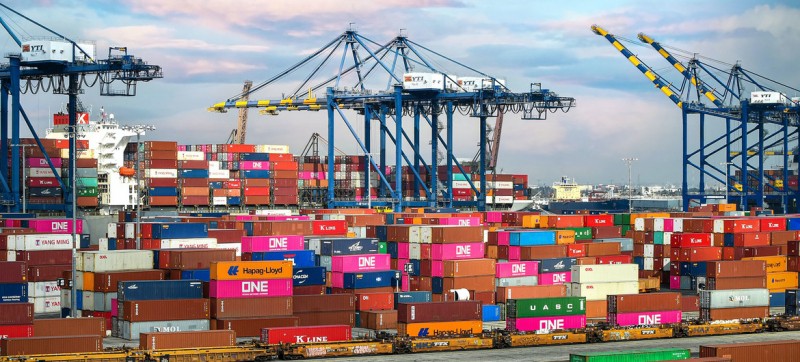World trade reaches all-time high, but 2022 outlook ‘uncertain’: UNCTAD
Global trade is expected to be worth about $28 trillion this year - an increase of 23 percent on pre-pandemic levels - but the outlook for 2022 remains very uncertain, UN economists said on Tuesday.
Shipping containers are loaded onto vessels at a port in Los Angeles, USA.
Global trade is expected to be worth about $28 trillion this year – an increase of 23 percent on pre-pandemic levels – but the outlook for 2022 remains very uncertain, UN economists said on Tuesday.
This strong growth in demand – for goods, as opposed to services – is largely the result of pandemic restrictions easing, but also from economic stimulus packages and sharp increases in the price of raw materials.
Trade in goods set a new record of $5.6tn in the 3rd quarter, according to @UNCTAD's new Global Trade Update.
Overall, trade is set to reach $28tn this year – 23% higher than in 2020 and 11% above pre-#COVID19 levels.
But growth remains highly uneven. https://t.co/zWSGZTpJlq pic.twitter.com/EhRdNRWCg9
— UNCTAD (@UNCTAD) November 30, 2021
Services still sluggish
In line with this overall increase, the services sector picked up too, but it has remained below 2019 levels.
From a regional perspective, trade growth remained uneven for the first half of the year, but it had a “broader” reach in the three months that followed, UNCTAD’s Global Trade update said.
Trade flows continued to increase more strongly for developing countries in comparison to developed economies overall in the third quarter of the year, moreover.
The report valued the global goods trade at $5.6 trillion in the third quarter of this year, which is a new all-time record, while services stood at about $1.5 trillion.
For the remainder of this year, UNCTAD has forecast slower growth for the trade in goods but “a more positive trend for services”, albeit from a lower starting point.
Among the factors contributing to uncertainty about next year, UNCTAD cited China’s “below expectations” growth in the third quarter of 2021.
“Lower-than-expected economic growth rates are generally reflected in more downcast global trade trends,” UNCTAD noted, while also pointing to inflationary pressures” that may also negatively impact national economies and international trade flows.
The UN body’s global trade outlook also noted that “many economies, including those in the European Union”, continue to face COVID-19-related disruption which may affect consumer demand in 2022.
Semiconductor stress test
In addition to the “large and unpredictable swings in demand” that have characterized 2021, high fuel prices have also caused shipping costs to spiral and contributed to supply shortages.
This has contributed to backlogs across major supply chains that could continue into next year and could even “reshape trade flows across the world”, UNCTAD cautioned.
Geopolitical factors may also play a role in this change, as regional trade within Africa and within the Asia-Pacific area increases on the one hand, “diverting trade away from other routes”.
Similarly, efforts towards a more socially and environmentally sustainable economy may also affect international trade, by disincentivizing high carbon products.
The need to protect countries’ own strategic interests and weaknesses in specific sectors could also influence trade in 2022, UNCTAD noted, amid a shortage of microprocessors called semiconductors that “has already disrupted many industries, notably the automotive sector”.
“Since the onset of the COVID-19 pandemic, the semiconductor industry has been facing headwinds due to unanticipated surges in demand and persisting supply constraints…If persistent, this shortage could continue to negatively affect production and trade in many manufacturing sectors.”




Comments are closed.